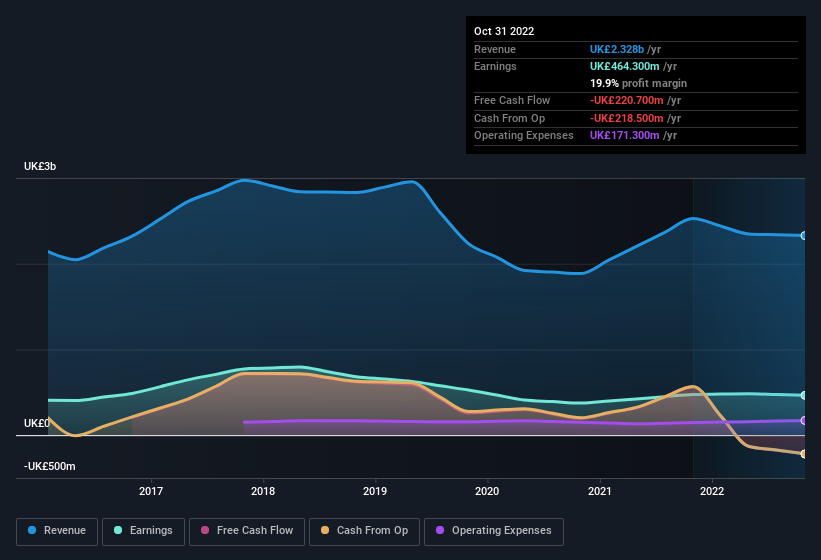- United Kingdom
- /
- Consumer Durables
- /
- LSE:BKG
Berkeley Group Holdings' (LON:BKG) Sluggish Earnings Might Be Just The Beginning Of Its Problems
A lackluster earnings announcement from The Berkeley Group Holdings plc (LON:BKG) last week didn't sink the stock price. We think that investors are worried about some weaknesses underlying the earnings.
Check out our latest analysis for Berkeley Group Holdings

Zooming In On Berkeley Group Holdings' Earnings
As finance nerds would already know, the accrual ratio from cashflow is a key measure for assessing how well a company's free cash flow (FCF) matches its profit. In plain english, this ratio subtracts FCF from net profit, and divides that number by the company's average operating assets over that period. This ratio tells us how much of a company's profit is not backed by free cashflow.
That means a negative accrual ratio is a good thing, because it shows that the company is bringing in more free cash flow than its profit would suggest. While it's not a problem to have a positive accrual ratio, indicating a certain level of non-cash profits, a high accrual ratio is arguably a bad thing, because it indicates paper profits are not matched by cash flow. To quote a 2014 paper by Lewellen and Resutek, "firms with higher accruals tend to be less profitable in the future".
For the year to October 2022, Berkeley Group Holdings had an accrual ratio of 0.28. We can therefore deduce that its free cash flow fell well short of covering its statutory profit. Even though it reported a profit of UK£464.3m, a look at free cash flow indicates it actually burnt through UK£221m in the last year. We saw that FCF was UK£566m a year ago though, so Berkeley Group Holdings has at least been able to generate positive FCF in the past. The good news for shareholders is that Berkeley Group Holdings' accrual ratio was much better last year, so this year's poor reading might simply be a case of a short term mismatch between profit and FCF. Shareholders should look for improved cashflow relative to profit in the current year, if that is indeed the case.
That might leave you wondering what analysts are forecasting in terms of future profitability. Luckily, you can click here to see an interactive graph depicting future profitability, based on their estimates.
Our Take On Berkeley Group Holdings' Profit Performance
Berkeley Group Holdings' accrual ratio for the last twelve months signifies cash conversion is less than ideal, which is a negative when it comes to our view of its earnings. Because of this, we think that it may be that Berkeley Group Holdings' statutory profits are better than its underlying earnings power. The good news is that its earnings per share increased slightly in the last year. At the end of the day, it's essential to consider more than just the factors above, if you want to understand the company properly. In light of this, if you'd like to do more analysis on the company, it's vital to be informed of the risks involved. For example, we've discovered 2 warning signs that you should run your eye over to get a better picture of Berkeley Group Holdings.
Today we've zoomed in on a single data point to better understand the nature of Berkeley Group Holdings' profit. But there is always more to discover if you are capable of focussing your mind on minutiae. Some people consider a high return on equity to be a good sign of a quality business. While it might take a little research on your behalf, you may find this free collection of companies boasting high return on equity, or this list of stocks that insiders are buying to be useful.
Valuation is complex, but we're here to simplify it.
Discover if Berkeley Group Holdings might be undervalued or overvalued with our detailed analysis, featuring fair value estimates, potential risks, dividends, insider trades, and its financial condition.
Access Free AnalysisHave feedback on this article? Concerned about the content? Get in touch with us directly. Alternatively, email editorial-team (at) simplywallst.com.
This article by Simply Wall St is general in nature. We provide commentary based on historical data and analyst forecasts only using an unbiased methodology and our articles are not intended to be financial advice. It does not constitute a recommendation to buy or sell any stock, and does not take account of your objectives, or your financial situation. We aim to bring you long-term focused analysis driven by fundamental data. Note that our analysis may not factor in the latest price-sensitive company announcements or qualitative material. Simply Wall St has no position in any stocks mentioned.
About LSE:BKG
Berkeley Group Holdings
The Berkeley Group Holdings plc, together with its subsidiaries, builds homes and neighbourhoods in the United Kingdom.
Excellent balance sheet and fair value.
Similar Companies
Market Insights
Community Narratives



